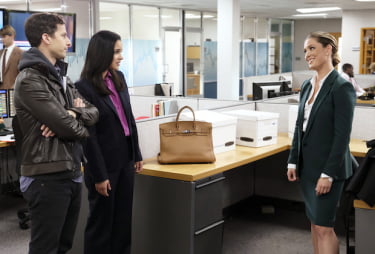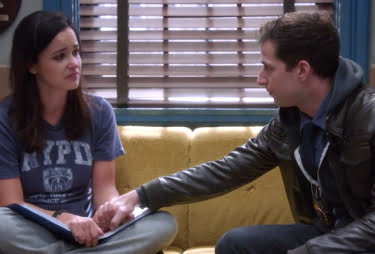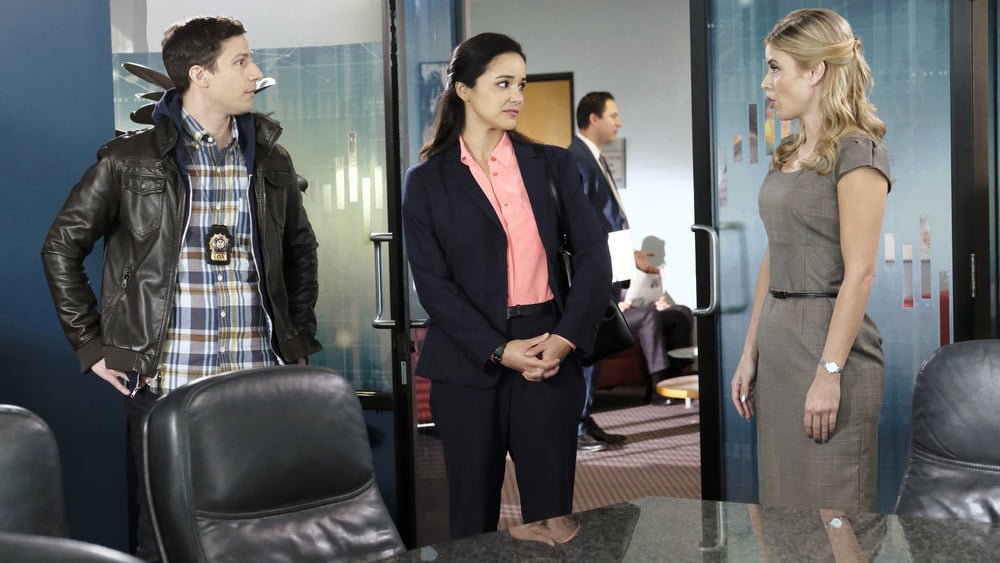It’s rare for a comedy to tackle serious political issues around gender. Sitcoms, especially, are usually light-hearted, funny and easy to watch. Brooklyn Nine-Nine, an American sitcom about a group of NYPD detectives, made an exception for their episode titled “He Said, She Said”.
The episode is centred around Amy Santiago (Melissa Fumero), a woman sergeant who is trying to solve a sexual assault case with her husband, Detective Jake Peralta (Andy Samberg). The case brings up some bad memories for Amy, bringing to light some of the uncomfortable things that she has experienced as a detective in a male-dominated industry. The episode, directed by Melissa Fumero’s castmate, Stephanie Beatriz, was sensitive, empowering and complex, all at the same time. It was incredibly refreshing to see the #MeToo movement portrayed on TV with such honesty.
Also read: Brooklyn Nine-Nine Is What TV (And The World) Should Look Like
The victim of sexual assault, Keri, is a successful woman in the finance industry. By virtue of her career and professionalism, she comes across as reserved, unemotional and composed. She tells Amy and Jake the story of her sexual assault in a calm, rational manner. The show does not punish Keri for not showing the ‘right’ or ‘expected’ emotions in the aftermath of a sexual assault; after all, every woman reacts differently to her trauma. Jake and Amy believe her simply because she is a real human being reporting a crime.
The show does not punish Keri for not showing the ‘right’ or ‘expected’ emotions in the aftermath of a sexual assault
In real life, questions like “If she was really the victim of sexual assault, why is she so calm?” would have been posed by the unrelenting press, court or public — people enjoy tearing a woman’s words and actions apart to find any sort of sign that she is lying. Instead, Amy and Jake work hard to provide evidence to back up Keri’s story, never questioning her trauma but also recognising that proof would always help a case.
There are two other pivotal and important things that happen in the episode. The first is the discussion that happens between Amy and Rosa Diaz (Stephanie Beatriz), Amy’s fellow detective. Despite the company offering Keri a large sum of money to keep her silent, Amy convinces Keri to file charges against the man who sexually assaults her. Rosa, on the other hand, thinks that Amy should have allowed Keri to drop the charges as openly confronting the man would put her through a whole ordeal and could cost her her job.

Amy’s position is built on principles and optimism — it is wrong to let a sexual assaulter go, and Keri’s case would inspire other women to come forward with their own stories. Rosa’s view is rooted in realism. “There is a very real woman here whose career and life will be affected by you pursuing this case,” she tells Amy. Brooklyn Nine-nine manages to present two sides of a very long and complex debate that is present in all types of activism; what are we willing to sacrifice for a cause?
Brooklyn Nine-nine manages to present two sides of a very long and complex debate that is present in all types of activism; what are we willing to sacrifice for a cause?
Despite the episode being focused on serious conversations like this, the show still retains its humour. The scene at Keri’s workplace is especially funny, with employees telling Amy and Jake how professional their workplace environment is while their colleague nicknamed Beefer is drunk and having a wild birthday party in the office.
There is also the incredible subplot of Captain Holt finding out that his arch nemesis, the Disco-Strangler, has escaped from prison. There were some great comedic moments between Holt and the Disco-Strangler. This subplot is far away from the sexual assault story, and is there to add humour to a heavy episode without making light of Keri’s case.

The other important scene in this episode is the conversation that Amy has with Jake. After she overworks herself and stays at the precinct overnight, trying to find evidence for the case, Jake gets worried and asks why this case is so important to her. Amy opens up and shares her own story about her previous boss who tried to kiss her after giving her a promotion because he “felt like he deserved something in return for my career”. The way Stephanie Beatriz shoots this scene is beautiful. She closes up on their faces, aiming the camera at Jake only when it is appropriate, and keeping Amy as the focus for most of the time.
Jake’s reaction is the perfect example of how an ally can support women. He admits to Amy, “Every time I think I understand how bad it is it’s just way worse than I imagined.” Jake acknowledges his privilege and ignorance and learns from Amy’s story. He holds her hand as she speaks to him with tears in her eyes, mostly keeping silent and listening to her. When the conversation is over, Jake stands up to get her a change of clothes and a coffee so she can keep working the case with his help. The case is solved when Amy has a eureka moment — the male ally is not the saviour here, but he is certainly a supportive husband to Amy.

In the end, Keri has to quit her job because of the backlash she faces after getting her assaulter fired. Amy is dejected, but Rosa tells her that Keri’s female ex-colleague has also come forward to file her own report on sexual assault in their workplace. The ending shows the harmony between realism and feminism. “Two steps forward, one step back is still one step forward,” says Rosa. The episode closes with Rosa and Amy going to take the statement from Keri’s ex-colleague together.
Also read: 10 Things Men Can Do To Dismantle Patriarchy In The Time Of #MeToo
Some fans complained that the episode was too political. But Brooklyn Nine-Nine was the perfect show to tackle the #MeToo movement. In the past, they have openly discussed racial profiling and issues in relation to coming out; the show is no stranger to politics. With strong women, people of colour, and several LGBTQ characters, this show has become a beacon of hope for us all.
References:
Featured Image Source: Variety
About the author(s)
Beverly Devakishen is a final year student at the University of East Anglia studying Literature and History. She is interested in Asian history, as well as issues around gender and sexuality. She is deputy editor for The Queer Review and has done journalism internships at newspapers such as The Guardian.





For a proper investigation to be conducted and a just verdict reached, facts must be checked many times, and just the word of a PERSON cannot be accepted as fact. Unless there is solid proof. Irl, many women are truly wronged (sadly). But there are also women who accuse men of assault dishonestly. I’m not saying that ,just because a women doesn’t burst into tears she hasn’t been traumatized. All I’m saying that even if she is crying like shit, facts must be referred to before judging. Liars are almost as common as the truly wronged. This has nothing to do with the severity of crime or the sex of the victim/perpetrator. This has to do with conducting a just trial. This also doesn’t mean that justice should be delayed in the name of perfectionism. What I wanted to say was: it wouldn’t be wrong of the detectives to question Keri’s reaction to trauma as long as they did it to check facts.
Very well written..
Yes, very well written. Makes me wanna re-watch the show.